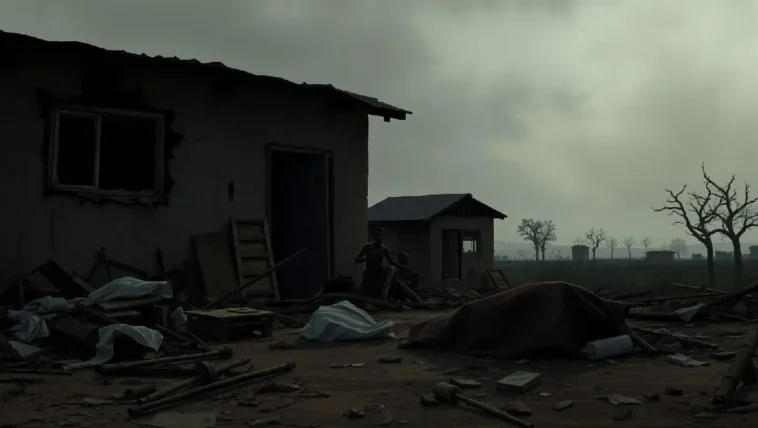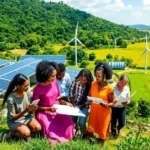Nigeria Christian Killings
Urgent! 100+ Christians Killed in Nigeria: April 2025 Massacre
Nigeria Christian Killings: A wave of violence in central Nigeria has left over 100 Christians dead, sparking international outrage and calls for urgent action.Nigeria Under Siege: Unmasking the April 2025 Christian Massacre and the Echoes of Impunity
The air in Central Nigeria hangs thick with grief and disbelief. April 2025 will forever be etched in the nation’s memory as a month of unspeakable horror, a period when the blood of over 100 Christians stained the land, painting a grim picture of religious persecution and systemic failure. The cries of the bereaved echo through the valleys of Plateau State, a haunting reminder of the lives brutally cut short and the simmering tensions threatening to tear the nation apart. This is not just a news story; it’s a cry for justice, a demand for accountability, and a desperate plea for peace.
Palm Sunday Bloodbath: A Chronicle of Carnage and Despair
Palm Sunday, a day of reverence and celebration for Christians worldwide, turned into a scene of unimaginable horror in Bassa, Plateau State. On April 13, 2025, armed assailants descended upon unsuspecting communities, unleashing a wave of terror that left 43 dead and countless others wounded. This wasn’t an isolated incident. It was part of a coordinated campaign of violence that saw Fulani militants launch at least eight raids on Christian communities between late March and mid-April. From funerals to fellowship gatherings, no place was safe from their bloodthirsty rampage.
The details are chilling. Eleven mourners, including a pregnant woman and a child, were mercilessly gunned down on March 27. Just days later, on April 2, five women attending a fellowship were brutally murdered. The attacks were swift, calculated, and devastating, leaving behind a trail of shattered lives and a community plunged into despair. The question on everyone’s lips: how could such barbarity be allowed to happen?
The sheer scale of the carnage is staggering. Bishop Matthew Kukah, a prominent voice for justice and peace, reported nearly 200 deaths in a single week, including 56 in Zikke on Palm Sunday alone. While other sources cite 113 deaths specifically in Plateau State, the discrepancies only underscore the chaos and confusion surrounding the tragedy. What is undeniable is the profound loss and suffering inflicted upon the Christian community in Central Nigeria.
The attacks have triggered a mass exodus, with over 3,000 people displaced from their homes. More than 300 houses have been reduced to ashes, and six individuals remain missing, their fate unknown. The once-vibrant communities now stand as ghost towns, haunted by the memories of those who perished and the fear of what the future holds. The displacement crisis is not just a statistic; it’s a human tragedy unfolding in real-time, with families torn apart and livelihoods destroyed.
Beyond the Numbers: Voices from the Abyss of Grief
Numbers can be numbing. They can obscure the raw, visceral pain of loss. To truly understand the magnitude of the April 2025 massacre, we must listen to the voices of those who survived, those who witnessed the horrors firsthand. These are not just victims; they are mothers, fathers, sisters, brothers, daughters, and sons whose lives have been irrevocably altered.
One survivor, a woman who lost her husband and two children in the Palm Sunday attack, recounted the chilling details of the assault. “They came in the night, shooting and burning everything in sight,” she sobbed. “I saw my husband fall, and I grabbed my children and ran. But they caught up with us. I couldn’t save them.” Her story is just one of many, a testament to the brutality and senselessness of the violence.
A local pastor, his voice trembling with emotion, described the scene he encountered after the attacks. “The bodies were everywhere,” he said. “Men, women, children – all lying lifeless in the streets. The smell of death was overwhelming. I couldn’t believe what I was seeing. It was like hell on earth.” These are the images that will forever haunt the survivors, the memories that will never fade.
These personal testimonies paint a vivid picture of the human cost of the violence. They remind us that behind every statistic is a story of loss, pain, and resilience. They serve as a powerful indictment of the forces that perpetuate such atrocities and a call for justice on behalf of the victims.
The displaced now face an uncertain future, grappling with trauma, hunger, and the daunting task of rebuilding their lives. They are in dire need of food, shelter, medical care, and psychological support. But more than anything, they need justice. They need to know that those responsible for the deaths of their loved ones will be held accountable.
The Fulani Militant Shadow: Unmasking the Architects of Anarchy
Who are the perpetrators of these heinous crimes? The finger of blame points squarely at Fulani militants, a loosely organized network of armed groups that have been terrorizing communities across Nigeria’s Middle Belt for years. These groups, often portrayed as nomadic herdsmen engaged in land disputes with farmers, are in reality well-equipped and highly organized, with a clear agenda of violence and expansion.
The Fulani militants operate with impunity, often exploiting the porous borders and weak security presence in the region. They are armed with sophisticated weapons, including AK-47s, machetes, and explosives, and they employ brutal tactics, such as arson, kidnapping, and sexual violence. Their attacks are often targeted at Christian communities, raising concerns about religious persecution and ethnic cleansing.
The motivations behind the violence are complex and multifaceted. Some analysts attribute it to competition over land and resources, exacerbated by climate change and population growth. Others point to religious extremism and the desire to impose Islamic law in the region. Still others see it as a manifestation of deep-seated ethnic tensions and historical grievances.
Regardless of the underlying causes, the Fulani militant violence poses a grave threat to Nigeria’s stability and unity. It has displaced millions of people, disrupted economic activity, and eroded trust between communities. It has also fueled a dangerous cycle of revenge and retaliation, making it increasingly difficult to find a peaceful resolution.
There are allegations of collusion between the militants and elements within the security forces, with some witnesses claiming that soldiers have stood by and watched as attacks unfolded. These allegations, if proven true, would represent a shocking betrayal of the public trust and a further indictment of the government’s response to the crisis.
Echoes of Christmas Eve: A Haunting Pattern of Impunity and Escalating Violence
The April 2025 massacre is not an isolated incident. It is part of a disturbing pattern of violence that has plagued Nigeria’s Middle Belt for years. In December 2023, a similar attack on Christmas Eve in Bokkos left nearly 200 Christians dead. The similarities between the two events are striking, raising questions about the effectiveness of the government’s security measures and the lack of accountability for perpetrators.
The Christmas Eve massacre, like the April 2025 attacks, was characterized by extreme brutality and a complete disregard for human life. Armed assailants stormed into communities, shooting, burning, and looting with impunity. The victims were mostly women and children, many of whom were killed in their homes as they slept.
Despite widespread condemnation and promises of action, few arrests have been made in connection with the Christmas Eve massacre. This lack of accountability has emboldened the perpetrators and fueled a sense of impunity, leading to further attacks and a deepening cycle of violence. The message is clear: in Nigeria, you can kill Christians with little or no fear of consequences.
The failure to address the root causes of the violence has only exacerbated the problem. Land disputes, religious extremism, ethnic tensions – these are all factors that contribute to the conflict. But until the government takes decisive action to address these issues, the violence is likely to continue.
The cycle of impunity must be broken. Those responsible for the Christmas Eve massacre and the April 2025 attacks must be brought to justice. The government must also take concrete steps to address the underlying causes of the violence and prevent future atrocities from occurring.
Government Response Under Scrutiny: Promises, Realities, and the Tranquilising Drug of Complacency
In the wake of the April 2025 massacre, the Nigerian government issued a flurry of statements condemning the attacks and promising to bring the perpetrators to justice. A “coordinated security response” was announced, with troops deployed to the affected areas. But for many Nigerians, these words ring hollow. They have heard them before, after countless similar incidents, with little or no tangible results.
Local leaders, like Titus Ayuba Alams, report persistent fear, school closures, and disrupted worship in the aftermath of the attacks. Witnesses allege delayed security responses and the disarming of Christian residents, leaving them vulnerable to further attacks. The perception is that the government is either unwilling or unable to protect its citizens, particularly those in predominantly Christian areas.
Bishop Matthew Kukah, a vocal critic of the government’s handling of the crisis, has accused the authorities of operating with a “tranquilising drug of complacency.” He argues that the government’s inaction has emboldened the perpetrators and created a climate of impunity. His words resonate with many Nigerians who feel abandoned and betrayed by their leaders.
The government’s response to the violence has been further complicated by allegations of bias and discrimination. Some critics accuse the government of favoring Fulani herdsmen over Christian farmers, citing the failure to prosecute those responsible for attacks on Christian communities. These allegations, whether true or not, have fueled resentment and mistrust, making it even more difficult to find a peaceful resolution.
The time for empty promises and half-hearted measures is over. The Nigerian government must demonstrate a genuine commitment to protecting all of its citizens, regardless of their ethnicity or religion. It must take decisive action to disarm the militants, prosecute those responsible for the violence, and address the underlying causes of the conflict.
Mapping the Conflict: Geopolitical Hotspots and the Spread of Sharia Law
To fully grasp the complexities of the conflict in Nigeria, it is essential to understand the geopolitical landscape. The violence is not confined to a single region; it is spreading across the Middle Belt, a diverse and strategically important area that straddles the predominantly Muslim north and the predominantly Christian south.
The Middle Belt is a melting pot of ethnicities and religions, a region where different cultures and traditions intersect. It is also a region where land and resources are scarce, leading to competition and conflict between different groups. The spread of Sharia law in the northern states has further exacerbated tensions, creating a climate of discrimination and intolerance.
The map of the conflict reveals a clear pattern of attacks targeting Christian communities in the Middle Belt. The hotspots include Bokkos, Bassa, and Zikke, all areas with a significant Christian population. These attacks are often carried out by Fulani militants, who are seeking to expand their territory and impose their will on the local population.
The spread of Sharia law in the northern states has created a parallel legal system that discriminates against Christians. Christians are often denied equal access to justice, and they are subjected to harassment and persecution. This has fueled resentment and anger, leading to further violence and instability.
The geopolitical dynamics of the conflict are complex and ever-changing. The rise of Boko Haram and other extremist groups has added another layer of complexity, as these groups seek to exploit existing tensions and expand their influence in the region. Understanding these dynamics is crucial to finding a lasting solution to the conflict.
Genocide or Persecution? Unraveling the Intent Behind the Atrocities
Is the violence against Christians in Nigeria genocide? This is a question that is hotly debated, with strong arguments on both sides. Some advocacy groups, like International Christian Concern, argue that the violence constitutes a calculated effort to erase Christians from Nigeria’s Middle Belt. They point to the systematic targeting of Christian communities, the destruction of churches, and the high number of Christian deaths as evidence of genocidal intent.
Others argue that the violence, while horrific, does not meet the legal definition of genocide. They contend that the attacks are primarily motivated by economic factors, such as competition over land and resources, rather than a deliberate attempt to exterminate Christians. They also point to the fact that Muslims have also been victims of violence in the region.
The legal definition of genocide, as defined by the United Nations Convention on the Prevention and Punishment of the Crime of Genocide, requires proof of intent to destroy, in whole or in part, a national, ethnic, racial, or religious group. Proving intent is often difficult, as it requires access to the minds of the perpetrators.
Regardless of whether the violence meets the legal definition of genocide, it is undeniably a form of persecution. Christians are being targeted for their faith, and they are being subjected to violence, discrimination, and oppression. This persecution must be condemned in the strongest possible terms, and those responsible must be held accountable.
The debate over whether the violence constitutes genocide or persecution should not distract from the urgent need to protect Christians in Nigeria. The focus should be on preventing further atrocities, providing humanitarian assistance to the victims, and addressing the root causes of the conflict.
The Economic Battlefield: Land Grabs, Displacement, and the Specter of Starvation
The violence in Nigeria’s Middle Belt is not just a humanitarian crisis; it is also an economic disaster. The attacks have disrupted agricultural production, displaced millions of people, and exacerbated food insecurity in the region. Christian farmers, who are the backbone of the local economy, have been particularly hard hit.
Fulani militants often target Christian farmers, seizing their land and destroying their crops. This has forced many farmers to abandon their land and flee to safer areas, leaving behind their livelihoods and their homes. The loss of farmland has had a devastating impact on the local economy, leading to food shortages and rising prices.
The displacement crisis has further compounded the economic problems. Millions of people have been forced to flee their homes, putting a strain on already scarce resources. The displaced are often dependent on humanitarian assistance for survival, and they are unable to contribute to the local economy.
The food insecurity crisis is particularly acute in the Middle Belt, where many people are struggling to feed themselves and their families. The violence has disrupted food supply chains, making it difficult to transport food to the affected areas. The rising prices of food have also made it unaffordable for many people.
The economic consequences of the violence are far-reaching and long-lasting. The destruction of infrastructure, the loss of farmland, and the displacement of people will take years to recover from. The government must take urgent action to address the economic crisis and provide support to the affected communities.
Global Outcry: A Symphony of Condemnation and Calls for Intervention
The April 2025 massacre has sparked a global outcry, with human rights organizations, religious leaders, and governments around the world condemning the violence and calling for action. The United Nations, the European Union, and the United States have all issued statements expressing their concern about the situation in Nigeria.
Human rights organizations, such as Amnesty International and Human Rights Watch, have documented the atrocities and called on the Nigerian government to investigate the attacks and bring the perpetrators to justice. They have also urged the international community to put pressure on Nigeria to protect its citizens and address the root causes of the conflict.
Religious leaders, including Pope Francis and the Archbishop of Canterbury, have expressed their solidarity with the victims and called for peace and reconciliation. They have also urged the international community to provide humanitarian assistance to the affected communities.
The United States has been particularly vocal in its condemnation of the violence. Several members of Congress have called on the Biden administration to designate Nigeria as a Country of Particular Concern (CPC) for religious freedom violations. This designation would allow the U.S. to impose sanctions on Nigeria if it fails to improve its human rights record.
The global outcry is a testament to the severity of the crisis in Nigeria. It is also a sign that the international community is watching and that Nigeria will be held accountable for its actions. The Nigerian government must heed the calls for action and take concrete steps to protect its citizens and address the root causes of the conflict.
Beyond Aid: Sanctions, Legislation, and the Global Magnitsky Act
While humanitarian aid is essential to alleviate the suffering of the victims, it is not enough to address the underlying causes of the conflict. The international community must also take more assertive measures to hold the perpetrators accountable and prevent future atrocities from occurring. This includes imposing sanctions, enacting legislation, and utilizing the Global Magnitsky Act.
Sanctions can be a powerful tool for pressuring governments to change their behavior. The U.S. and other countries could impose sanctions on Nigerian officials who are complicit in the violence or who are obstructing efforts to bring the perpetrators to justice. These sanctions could include asset freezes, travel bans, and restrictions on trade.
Legislation can also be used to address the crisis. The U.S. Congress could pass legislation that would require the State Department to report on the situation in Nigeria and to develop a strategy for addressing the conflict. This legislation could also authorize the use of sanctions and other measures to pressure Nigeria to improve its human rights record.
The Global Magnitsky Act is a powerful tool that allows the U.S. government to impose sanctions on individuals who are responsible for human rights abuses and corruption. This act could be used to target Nigerian officials who are complicit in the violence or who are obstructing efforts to bring the perpetrators to justice.
These measures are not a panacea, but they can be effective in pressuring the Nigerian government to take action and in holding the perpetrators accountable. The international community must use all of the tools at its disposal to address the crisis in Nigeria and protect its citizens.
Faith Under Fire: Holy Week as a Symbol of Dismantling Christian Identity
The timing of the April 2025 massacre, coinciding with Holy Week, carries a chilling symbolism. Holy Week is the most sacred time of the year for Christians, a period of reflection, prayer, and remembrance of the suffering and death of Jesus Christ. To attack Christians during this time is not just a crime against humanity; it is an assault on their faith and their identity.
The attacks during Holy Week send a clear message: Christians are not welcome in Nigeria. The perpetrators are seeking to dismantle Christian identity and to erase the Christian presence from the region. This is a form of religious cleansing, a deliberate attempt to create a homogenous society where Christians are not allowed to practice their faith freely.
The destruction of churches during Holy Week is particularly egregious. Churches are not just buildings; they are sacred spaces where Christians gather to worship, to pray, and to find community. To destroy a church is to destroy a symbol of hope and faith.
The attacks on Christian leaders and pastors are also deeply troubling. These leaders are often the glue that holds communities together, providing guidance, support, and hope in times of crisis. To target them is to target the very heart of the Christian community.
The attacks during Holy Week are a stark reminder of the challenges that Christians face in Nigeria. They are also a call to action, a reminder that Christians must stand together in solidarity and defend their faith and their identity.
Charting a Path Forward: A Vision for Reconciliation, Justice, and Lasting Peace
The crisis in Nigeria is complex and multifaceted, with no easy solutions. However, there are steps that can be taken to address the root causes of the conflict and to build a more peaceful and inclusive future. These steps include promoting reconciliation, ensuring justice for victims, and addressing the underlying economic and social inequalities.
Reconciliation is essential to healing the wounds of the past and building trust between communities. This requires dialogue, understanding, and a willingness to forgive. It also requires acknowledging the suffering of all victims and addressing their grievances.
Justice for victims is also crucial. Those responsible for the violence must be held accountable for their actions. This requires a fair and transparent legal system that is free from bias and corruption. It also requires providing reparations to the victims and their families.
Addressing the underlying economic and social inequalities is also essential. This requires investing in education, healthcare, and infrastructure in the affected areas. It also requires promoting economic opportunities for all Nigerians, regardless of their ethnicity or religion.
The path forward will not be easy, but it is essential to building a more peaceful and prosperous future for Nigeria. The Nigerian government, the international community, and all Nigerians must work together to achieve this goal.
The time for complacency is over. The world is watching. The future of Nigeria hangs in the balance. Let us rise to the challenge and build a nation where all citizens can live in peace, security, and dignity. Join the conversation. Share your thoughts and opinions.
As the world grapples with the unfolding tragedy in Nigeria, many are searching for ways to stay informed and support those affected. The complexities of the conflict often leave individuals feeling helpless, yearning for deeper understanding and a means to contribute to a solution. From seeking reliable news sources to exploring avenues for humanitarian aid, the desire to make a positive impact is palpable.
Staying informed is the first step towards understanding and addressing the crisis. Access to accurate and timely news allows individuals to grasp the nuances of the situation, debunk misinformation, and advocate for effective solutions. High-quality journalism plays a crucial role in holding those in power accountable and amplifying the voices of the marginalized. We encourage you to explore reputable news outlets, engage in thoughtful discussions, and share verified information to raise awareness about the challenges facing Nigeria. Your engagement is vital in fostering a global community that cares and acts.
Are you looking for reliable sources to stay updated on the Nigeria crisis and other global events? Do you want to support quality journalism that brings you accurate and timely news? Explore our curated selection of resources and products that can help you stay informed, engage in meaningful discussions, and contribute to positive change. Don’t forget to share your thoughts in the comments below and subscribe to the Naija NewsBurrow newsletter for the latest updates and exclusive content.
Shop Products On Amazon
Shop Products on Ebay


![S L1600 2022/23 nigeria away jersey nike soccer super eagles [dn0695-100] msrp $95 new](https://i.ebayimg.com/images/g/bOUAAOSwVC1m81dE/s-l1600.jpg)






Trending Similar Stories in the News
More Than 170 Christians Killed During Lent, Easter in Nigeria International Christian Concern...
Fears remain this Easter that Christians in Nigeria are being ‘wiped out' by Muslim extremists Fox News...
Trending Videos of Nigeria Christian Killings
Breaking News: Nigerians Rejoice As Fulani Herdsmen Attacks Goes International #TheAfricaNewsChannel
Similar Popular Articles
#Nigeria #ChristianPersecution #ReligiousViolence #HumanRights #PrayForNigeria
Nigeria, Christian, Killings, Violence, Plateau






💬 What’s your take? Drop a comment below! ⬇️
#BreakingNews #LatestUpdate #StayInformed
📖 Read More: https://honeydew-zebra-306959.hostingersite.com/nigeria-christian-killings-april-2025/
Urgent! 100+ Christians Killed in Nigeria: April 2025 Massacre
💬 What’s your take? Drop a comment below! ⬇️
#BreakingNews #LatestUpdate #StayInformed
📖 Read More: https://tinyurl.com/yub9mtyq